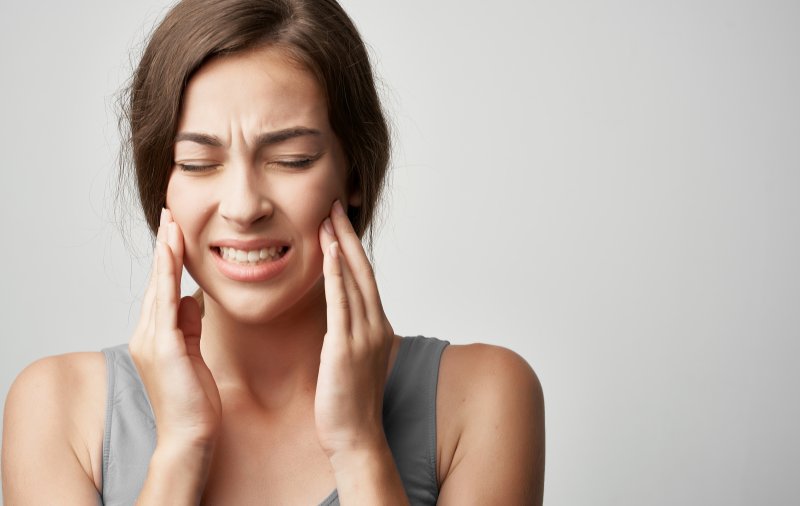
Across the country, dentists are seeing more and more patients who are suffering from jaw pain. Women in particular are prone to more severe symptoms and chronic discomfort. While the connection might not be obvious on the surface, the sudden outbreak of TMJ problems is definitely linked to the COIVD-19 pandemic – or, more accurately, the stress that it causes. If you’re a woman who has recently noticed an aching sensation in your jaw, read on to learn why you might currently be at risk for a TMJ disorder in South Portland.
What Causes TMJ Disorder?
A TMJ disorder is a problem with the joints that connect the lower jaw with the upper jaw and allow you to move your mouth for biting and speaking. The disks of the joints might have become dislocated, or the joint itself might have become damaged by a blow or an impact. There are several risk factors that can contribute to a TMJ disorder, such as arthritis or injury, but one of the most common issues is frequent grinding or clenching of the teeth, also known as bruxism. While the exact cause of bruxism isn’t fully known, it does seem to be closely linked with anxiety, stress, frustration, and similar emotions.
How is COVID-19 Linked to TMJ Disorders?
COVID-19 has given people plenty of reasons to feel stressed out or frustrated. From worrying about loved ones to losing jobs, from having their normal routines disrupted to not being able to see friends and families very often, the pandemic has taken quite a toll on everyone’s mental state. As such, cases of bruxism are becoming more and more widespread, and when people aren’t made aware of them in time, a severe TMJ disorder may eventually result.
Why are Women at Greater Risk for TMJ Disorders?
Women are generally found to be at greater risk for TMJ disorders than men. In particular, women between the ages of 18 and 44 are generally more susceptible to them; in contrast, age doesn’t seem to play any particular role in men. Researchers are still trying to figure out why women seem more susceptible to TMJ disorders; hormones are though to play a role, but jaw anatomy, physiology, and pain perception seem to matter as well.
What Can You Do About a TMJ Disorder?
You should see your dentist as soon as possible if you’re suffering from chronic jaw pain. Once they’ve properly diagnosed your condition, they can design an occlusal splint to help you find relief. The splint will prevent the teeth from grinding against each other and help ease the strain on the joints. Other treatment options might be recommendd based on the apparent risk factors.
When you notice possible warning signs of a TMJ disorder, you’ll want to act quickly. When COVID-19 has already got you feeling more stressed than normal, the last thing you want is to force yourself to live with constant jaw pain.
About the Author
Dr. Katherine Paret’s goal for Mind Your Mouth is to have a practice where you can get high quality dental care while also receiving the support you need to live an overall healthy lifestyle. She has participated in a number of courses to learn more about treating temporomandibular joint disorder. To schedule an TMJ consultation with her, visit her website or call (203) 915-5201.

